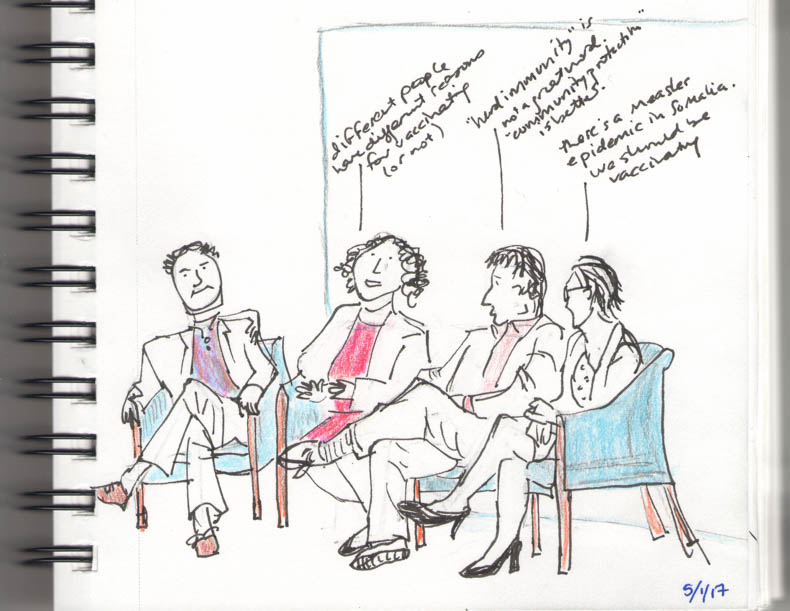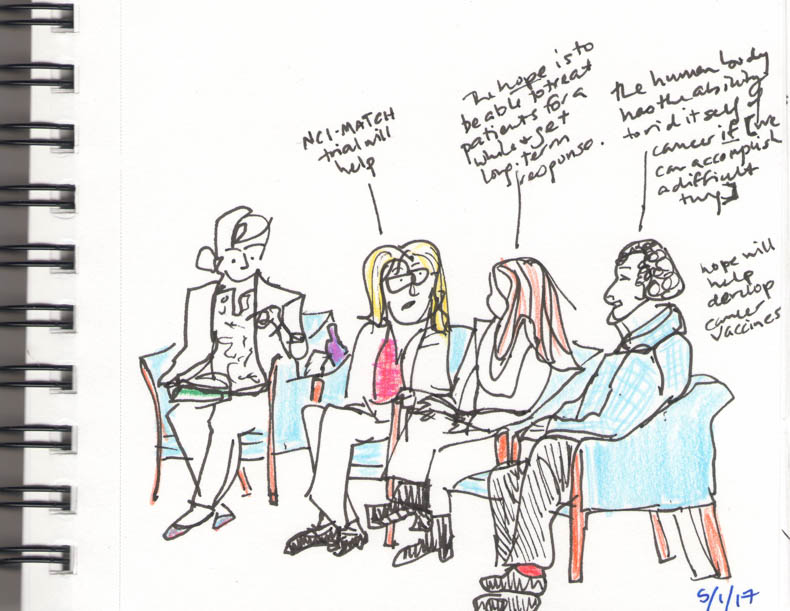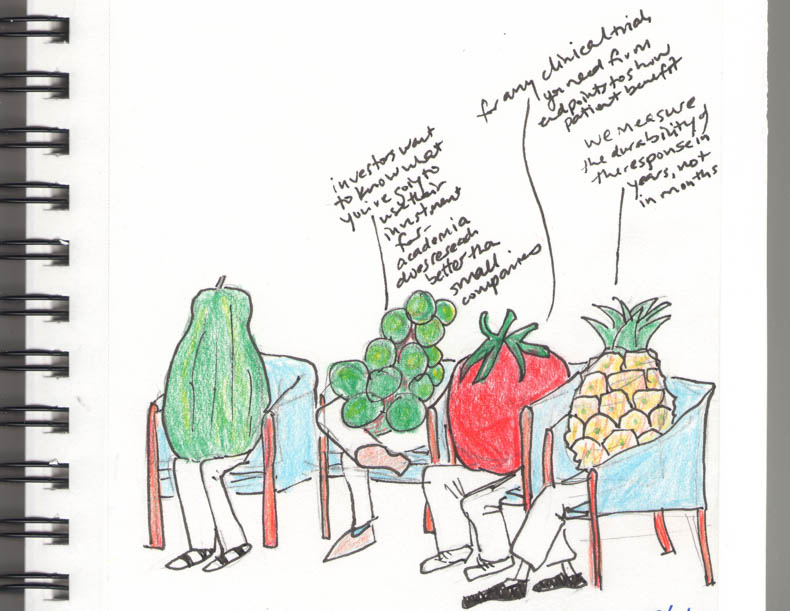
Every year, Johns Hopkins Medicine runs a boot camp for science writers in Washington, D.C. They cover some topic in science. For science writers, it’s a free introduction to a hot area of science (with breakfast, lunch, and tasty snacks). For Hopkins, there’s a chance someone will decide to use one of their experts in a story. Everybody wins, especially those of us who like cookies.
This was the first year I went to the boot camp; my employer sent several of us to spend the day learning about the latest research on the immune system.
The immune system is fantastically complex. I took a whole class on it in college and still have a weak grasp on how it works. I have a weak grasp on a lot of things from college. In fact, I just now started questioning whether I’d even taken immunology, so I checked my transcript, and don’t worry—I did. I even got an A.
From my seat of amazing immune system expertise, I can tell you that it involves a lot of kinds of cells, some of which produce antibodies, some of which respond to antibodies, and some of which have absolutely nothing to do with antibodies. It is very good at protecting you from stuff.
Including pollen. I would prefer mine to stop trying so hard to protect me from pollen.
After a few talks about recent research, the bulk of the day was taken up with panel discussions.
The first was on how climate change is affecting human health, and what effects might be expected in the future.

I’ve started drawing to help me focus in meetings. I didn’t need to take detailed notes, so I listened to the panelists while my eyes and hands conferred on where the lines of the their chairs and arms intersected.
Unfortunately, I have lousy handwriting, and I was really just taking notes for myself. Here’s what I wrote above the panelists’ heads:
- We live in air-conditioned and screened-in houses that keep mosquitoes out. – He was explaining that part of the reason why we don’t see that many mosquito-borne diseases in Washington, D.C. is how we live.
- “A lot of people write off the snot problem.” This guy was talking about runny noses, which are near-ubiquitous in developing countries with pollution problems.
- Wear long pants – This is your free piece of advice on tick-borne diseases.
- There’s a rise in asthma not due to genetics. – Asthma is increasing, and it’s not because it’s getting more common in the gene pool somehow.
That other stray note says “Undoing clean air, clean water will affect people fast.” The panelists were worried about potential rollbacks of environmental regulations.
The next panel was on vaccines and science denial.

This time I thought maybe colored pencils would bring a certain something. I only had a few colors on me.
Notes:
- Different people have different reasons for vaccinating (or not). – The hard-core anti-vaccine activists who, despite all evidence, still believe that vaccines cause autism, are rare. But there are plenty of other people who have various worries and suspicions about vaccines.
- “Herd immunity” is not a great word. “Community protection is better.” – “Herd immunity” is the concept that if a lot of people are protected against a disease, it’s hard for that disease to bounce around in the population. He’s right, it’s not the most attractive term.
- There’s a measles epidemic in Somalia. We should be vaccinating.
The third panel was on cancer immunotherapy. Apparently this is the hot area of cancer research these days. It’s about getting the patient’s own immune system to attack cancer cells.
What I took away from this panel: Seems like a promising area; some of these already exist and are available, for certain cancers; and oh golly there’s a lot more to learn.

It was mid-afternoon and I was getting a little loopy. And cartoony. I’m a little afraid that some panelist or moderator will stumble across this blog post and be insulted by how bad they look. To them I apologize: It’s not you. You’re beautiful. I’m just terrible at drawing people.
Notes:
- NCI-MATCH trial will help. – NCI-MATCH is a huge clinical trial that is trying to match drugs to people based on the genetics of the tumor. Read more from the National Cancer Institute (NCI).
- The hope is to be able to treat patients for a while and get a long-term response. – With immunotherapy, you should be able treat a person for a few months to teach their immune system what the cancer looks like, then stop treatment–and, much later, the immune system will still know that it’s supposed to attack those cancer cells. She hopes.
- The human body has the ability to rid itself of cancer if we [do a complicated thing]. – I didn’t capture the exact complicated thing he was talking about, but it sounded like a pretty big “if.”
The final panel of the day was supposed to be about how research is funded but was still mostly about cancer immunotherapy, I think. It was the end of the day. My attention had largely run out. I was tired of drawing people in chairs. Also, I know the moderator and didn’t want to do a terrible drawing of her. So instead I made her into a papaya.

Notes:
- Grapes: Investors want to know what you’re going to use their investment for—academia does research better than small companies.
- Tomato: For any clinical trial, you need firm endpoints to show patient benefit. – Endpoints are what you measure in a clinical trial. Like, if you’re trying to get the FDA to let you market a new drug for high blood pressure, one of your endpoints should probably be decreased blood pressure. (Just spitballing here. I’ve never actually tried to get approval for a new antihypertension drug.)
- We measure the durability of the response in years, not months. – This is that point about immunotherapy again, that people should theoretically stay cancer-free for a pretty long time after they stop treatment.
It was a good day. I learned some things. And you get to look at fruits in chairs.
Art: Helen Fields. 100% Helen Fields.
My favorite post of the year. Maybe ever.
agreed this was awesome!!! more please
I enjoyed this, especially the appearance of the man “answering” the snot problem with “Wear long pants”.
Hooray for pants, and fruit!
Absolutely delightful. I’ve already read it four or five times. Helen, please keep drawing and sharing your art!
Terrific. (I am an immunologist)